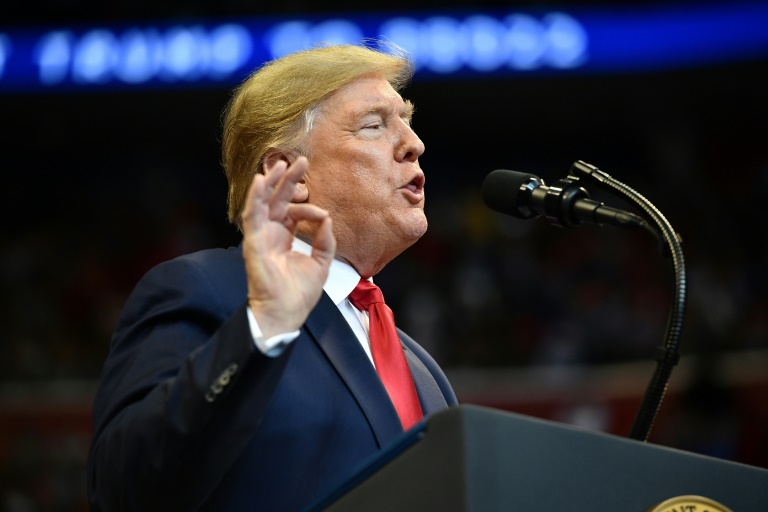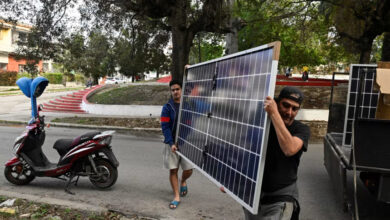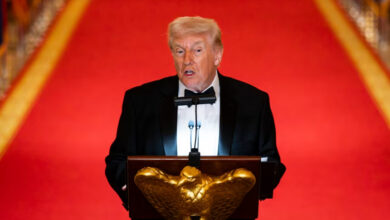
In Washington these days, there are facts, alternative facts and disputed facts.
It also seems like there are Democratic facts and Republican facts.
The acrimonious impeachment proceedings against President Donald Trump have put the spotlight on the stark partisan split in the nation’s capital over where the truth lies.
“There’s always been a divide between liberals and conservatives in the United States over opinions,” said Richard Hasen, a professor of law and political science at University of California, Irvine.
“Where things have changed is that there’s now much more disagreement along party lines as to basic facts.”
Democrats and Republicans tend to diverge on more and more subjects including, for example, whether climate change is real and whether Russia or Ukraine interfered with the 2016 US presidential election.
“On each of these things polling shows a divide between Republicans and Democrats as to what the state of the world is,” said Hasen, author of “Election Meltdown: Dirty Tricks, Distrust and the Threat to American Democracy.”
“That’s why some of us think of this as kind of a post-truth era.”
Trump rose to political prominence by peddling the lie that former president Barack Obama was born in Kenya and Democrats accuse the Republican leader of turbocharging the polarized environment with fabrications.
The Washington Post maintains a Fact Checker database of “false or misleading claims” made by Trump since taking office. It was last updated on October 9 at which time it listed 13,435 examples.
– ‘Alternative facts’ –
Trump’s senior aide Kellyanne Conway coined the term “alternative facts” just days after he took office while defending the debunked White House claim that the 45th president’s inauguration crowd was larger than Obama’s.
As for the facts surrounding impeachment, Trump insists his July 25 phone call with Ukrainian President Volodymyr Zelensky was “perfect.”
Democrats say it was anything but — that asking the Ukrainian leader to open an investigation into Democrat Joe Biden was an abuse of power and grounds for removing Trump from office.
“People can literally read the same words and think they are saying something entirely different,” said David Barker, a professor of public affairs at American University.
“Trumpists have T-shirts that say ‘Read the Transcript,'” Barker said. “Well everybody on the other side says ‘We’ve read the transcript and that’s the whole problem.'”
Defending the president in the House Judiciary Committee, Georgia lawmaker Doug Collins, the ranking Republican, said the impeachment case boils down to a set of “disputed facts.”
“The very nature of the fact that I say I disagree and you say you don’t is a disputed fact,” Collins told committee Democrats. “It’ll be the first impeachment that is partisan on facts that are not agreed to.”
Barker, co-author of the book “One Nation, Two Realities: Dueling Facts in American Democracy,” points to the role played by “tribal differences” between Republicans and Democrats.
“We don’t shop at the same stores, we don’t drink the same beer, we don’t eat in the same restaurants,” he said. “We don’t listen to the same music, we don’t go to the same movies and we don’t live anywhere remotely near each other anymore.
“All of those changes in our lifestyle, these tribal differences, have led to this situation where we don’t believe information anymore unless it comes from someone within our tribe,” he said.
“You can fact-check them all day long,” Barker said, “and it’s just fake news to them.”
– Social media fog –
Americans may once have looked to newspapers, television and magazines to get their facts but that is less the case in an increasingly partisan media environment.
A new Pew Research Center survey found that Republicans are far more skeptical of the news media than Democrats.
Forty percent of the Republicans surveyed who approve of Trump’s job performance said journalists have “very low” ethical standards. Just five percent of Democrats hold that view.
“We’re also in the midst of a technological revolution in which the intermediaries that have served as arbiters of the truth have now been undermined by the rise of social media,” Hasen said.
“The way we get our feeds on social media we tend to share messages that reinforce what we already believe,” he said. “People live in different factual universes.”
This poses problems to good governance now and going forward.
“A democratic republic really cannot function this way,” Barker said. “People talk about a marketplace of ideas. Well we have a marketplace of reality.”
Hasen warned that partisan disagreement over what constitutes a fact can have potentially ominous consequences such as when it comes to “people’s willingness to accept election results.”
“I’m very worried about this upcoming election,” he said of the November 2020 US presidential vote.
Image: AFP/File / MANDEL NGAN US President Donald Trump has made thousands of “false or misleading claims” since taking office, according to a fact-checking database compiled by The Washington Post




